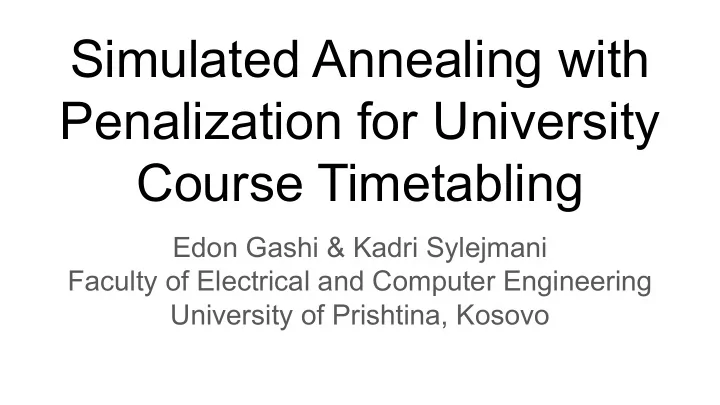

Simulated Annealing with Penalization for University Course Timetabling Edon Gashi & Kadri Sylejmani Faculty of Electrical and Computer Engineering University of Prishtina, Kosovo
Overview ● Solution model ● Operators ● Evaluation ● Simulated Annealing ● Penalization ● Random walks
Solution model ● Solutions are complete ○ Variables are always assigned ○ Infeasible combinations possible ● Three types of penalties ● Soft penalty ○ ITC19 solution score ● Hard penalty ○ Conflict between classes ○ Unavailable rooms ○ Unsatisfied required constraints ● Class overflow penalty ○ Easier to satisfy
Mutations & Operators ● Mutations ○ Class – Time change ○ Class – Room change ○ Student – Course – Configuration change (when p h = 0) ● High performance ○ Structural sharing ○ Delta evaluation ● Neighborhood operator ○ 50% chance for 1 mutation ○ 50% chance for 1 – 3 mutations ● Initial solution ○ Variables set to 1 of 3 lowest soft penalty assignments
Evaluation – Search Penalty
Evaluation – F STUN Wolfgang Wenzel and Kay Hamacher Stochastic tunneling approach for global minimization of complex potential energy landscapes . Physical Review Letters 82.15 (1999): 3003.
Simulated Annealing ● Lundy and Mees cooling schedule* ● Times out after a while ● Penalize and increase temperature * Miranda Lundy and Alistair Mees Convergence of an annealing algorithm . Mathematical programming 34.1 (1986): 111-124.
Penalization
Random walks ● Penalization may fail with large distribution constraints ● Focus on persistently unsatisfied constraints ● Hill climb with random walk operator ● Return to regular search after timeout
Summary ● Fast ● Problem agnostic ● Good overall results ● Two-phase approach limits search space ○ Poor results for some problems ● Open source github.com/edongashi/itc-2019
Recommend
More recommend